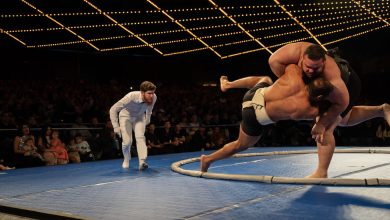Aryna Sabalenka Wins the Australian Open Women’s Singles Title

Ayrna Sabalenka is no longer afraid of big stages.
Overcoming a history of buckling under the pressure of late-round Grand Slam tennis, Sabalenka, the powerful 24-year-old from Belarus, came from behind to beat Elena Rybakina of Kazakhstan 4-6, 6-3, 6-4 in the women’s singles final of the Australian Open on Saturday.
In a matchup of two of the biggest hitters in the sport, Sabalenka was a few clicks more clinical than Rybakina in the crucial moments to cap off a dominant summer of tennis in Australia. It was Sabalenka’s first Grand Slam title in a rocky career that has included the kind of error-ridden, big-moment meltdowns from which some players almost never recover.
Instead, the match proved a microcosm of Sabalenka’s career — a shaky start, filled with ill-timed double faults followed by a steadying midmatch recovery before a final-set display of raw power and precision that her opponent could not answer.
Rybakina, a native Russian who became a citizen of Kazakhstan five years ago in exchange for financial support, was aiming to back up her championship run at Wimbledon and announce herself as the major threat in women’s tennis.
Instead it was Sabalenka who showed the mettle needed to survive the kind of high-risk, high-reward tennis battle that had seemed inevitable from the first days of a tournament in which the conditions were ideal for the biggest, flattest hitters.
When players first began arriving in Melbourne more than two weeks ago, they said the combination of heat, humidity and court preparation had made the balls difficult to spin, giving the edge to players who hammer their first serves and rips at nearly every rally ball as though they get extra credit for velocity.
That suited Rybakina and Sabalenka just fine, as they played with the silver champion’s trophy sparkling on a pedestal in the corner of the court, in case either of them tried to pretend this was just another match.
Entering the finals, Rybakina led the field with in aces with 45. Sabalenka was third with 29. They were first and second in hitting winners off their opponents’ serve, and at the top of the charts in peak serve speed, with both cracking 120 miles per hour.
Subtle, deft, tennis this was not, and for Rybakina it was so different from her championship match at Wimbledon in July, when she played Ons Jabeur of Tunisia, one of the most creative players in the game.
It was also different psychologically, too and not only because she was doing something in Australia that she had already done before and her opponent had not.
During Wimbledon, Rybakina, a Russian through her childhood who became a citizen of Kazakhstan at 18 when the country promised to pay for her tennis training, spent the better part of two weeks talking about whether she was actually Kazakh or Russian and being asked to answer for her native country’s invasion as she stampeded to the title. Her family still lives in Russia, and Wimbledon had prohibited players from Russia and Belarus from participating.
That sidelined Sabalenka, one of the few players who can match, and often top, Rybakina thump for thump.
This is a developing story. Check back for updates.



